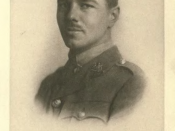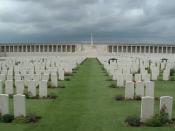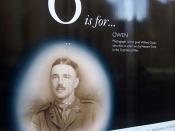"Dulce et decorum est pro patria mori", "it is sweet and right to die for your country", is a phrase that was widely used at the time of World War I to glorify the war and to encourage young men to fight. This saying became a form of a moral inducement for many young men to take part in World War I, because it created the idea that the soldier's death for his country is highly admirable and patriotically heroic. Wilfred Owen, on the other hand, dismisses the propagandistic idea of honourable death and downplays the glory of the war in his poem "Dulce et decorum est pro patria mori". He does this through the realistic representation of the bloody battlefield activities, the appalling scenery of death, and the horrifying effects of the soldier's wartime experience.
Owen opens his poem with a depiction of World War I soldiers.
He describes them as "old beggars" and coughing "hags". Instantly, Owen's description of the combat troops creates a conflict with the conventional public perception of war. The majority of the people who participated in World War I were young men. Young, healthy men are the primary targets of any wartime recruitment due to their physical strength and stamina which are necessary qualities to have in any combat environment. Consequently, when Owen chooses to describe the soldiers using adjectives such as "old" and "coughing", it seems strange, and provokes the reader to think of the reasons behind the author's word choice.
Owen portrays the soldiers as sick, old creatures in order to demonstrate the wearing, demoralizing effect that the war has on people. In the first stanza, the author enlightens the reader about the harsh struggle and brutal experience that the young men who arrive overseas have to...


